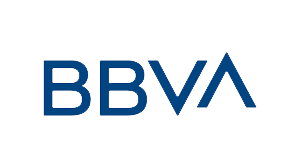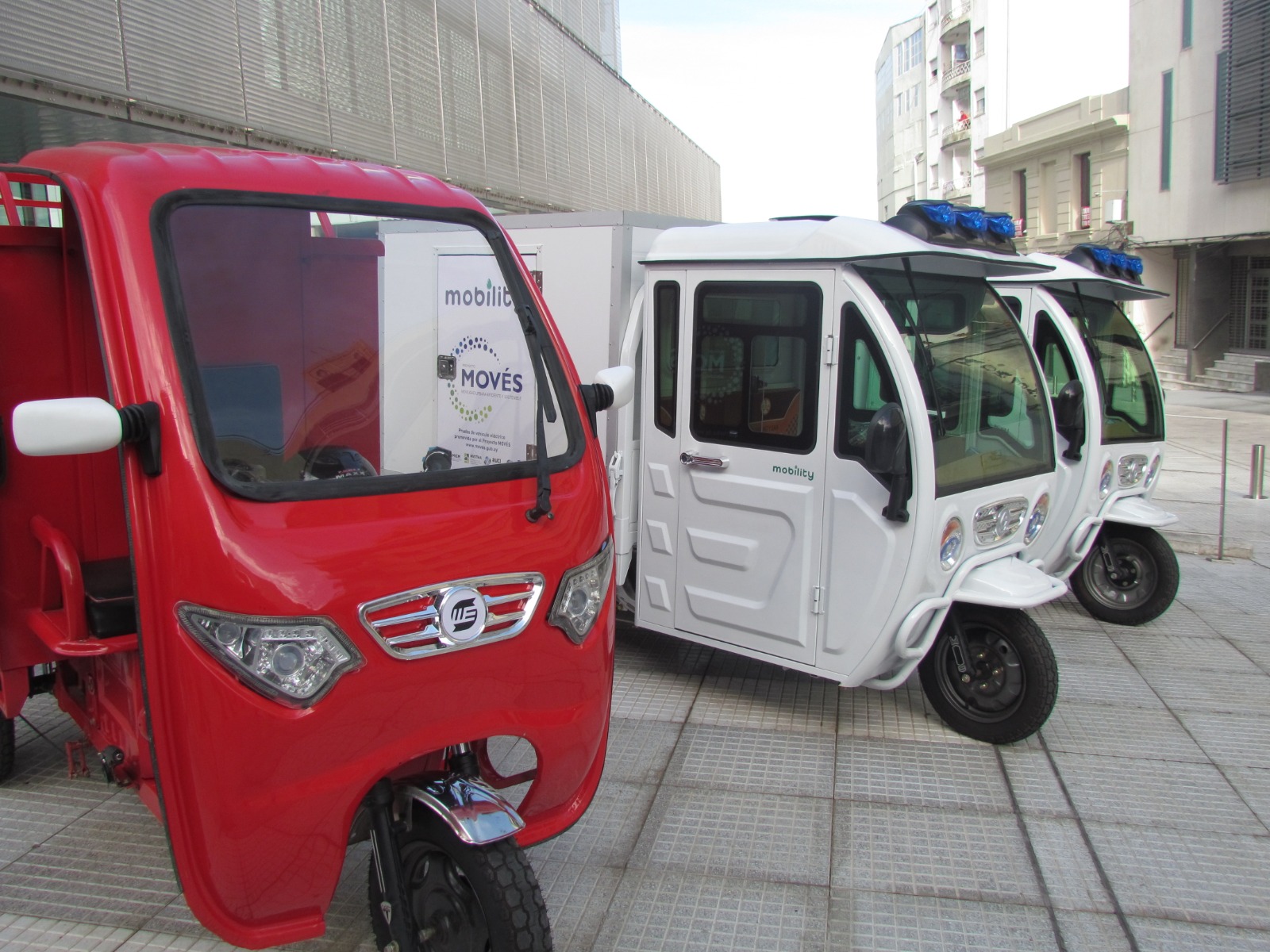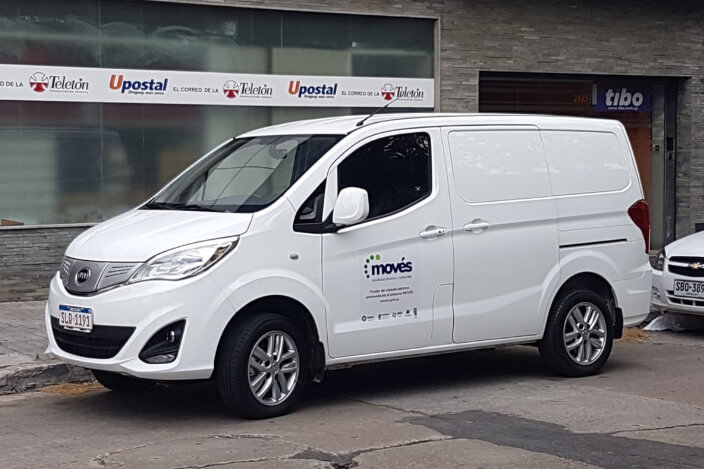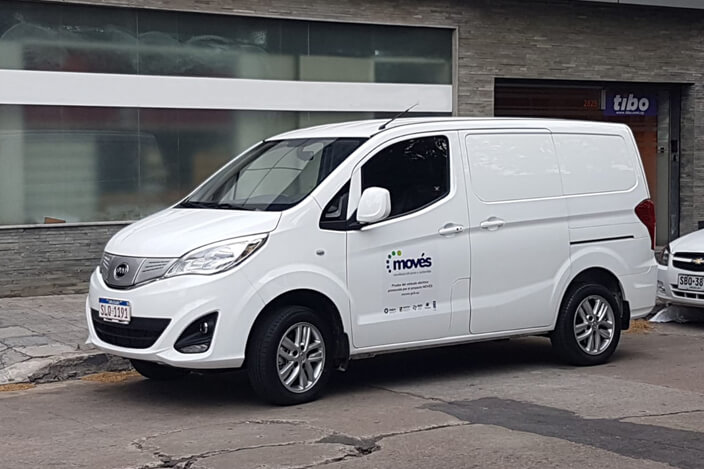What is the Sustainable Mobility Promotion Ecosystem for companies?
It is a set of benefits, public policies and private initiatives that come together to promote the adoption of electric vehicles in companies, particularly for transport, delivery and last mile logistics operations.
The Ecosystem’s goal is to provide mechanisms to incorporate efficient and emission-free vehicles, helping to minimize purchase barriers.
It includes: the investment promotion law, green loans from banks, IMESI and TGA differentiated structure for electric vehicles, reduced circulation tax for electric vehicles, BSE promotional insurance, the Energy Efficiency Certificates, IADB’s application that allows to carry out an electric vehicles virtual test, the electric vehicles free trial for companies and the Green Fleet Plan of the MOVÉS Project.
To buy
Investment promotion law
Law No. 16,906 promotes investments through specific tax benefits, and electric vehicles are eligible for these. It allows an IRAE exemption from 35% to more than 70% of the vehicle’s value, depending on how the investment is structured.
This benefit seeks to incentivize companies to purchase electric cargo vehicles and electric passenger vehicles fleets (minimum 5 units for the latter), and to encourage passenger and cargo vehicles acquisition in rental companies.
How does it work?
To apply for this benefit, it is necessary to submit an investment project to the Investment Law Enforcement Commission (COMAP). The percentage of the investment to be exempted will depend on the score obtained from the project evaluation matrix. This matrix includes indicators such as: job creation, increased exports, decentralization, inclusion of clean technologies (in which electric vehicles are included), a commitment to research, development and innovation, and other specific indicators.
IMESI and TGA
Considering the higher purchase cost of electric vehicles compared to combustion vehicles, a preferential Internal Specific Tax (IMESI) rate was generated for the most efficient units: hybrids and electric.
Electric vehicles’ IMESI is 5.75% and hybrids 3.45%, while taxes for combustion units ranges are between 23% and 115%. If the buyer is an IRAE or IMEBA taxpayer, for electric vans and wagons the IMESI is 2.30% and for hybrids 1.15%, while for combustions ones it is between 34.7% and 80.5 %.
Electric vehicles’ Global Tariff Rate (TGA) is 0%.
Green credits
In addition to tax benefits, improved financing conditions for these vehicles are required in order to reduce acquisition barriers. Thus, MOVÉS signed agreements with financial institutions, which as a result offer Green Credits with improved financing conditions for investment in electric vehicles.
Due to its nature of higher purchase cost and lower cost of operation compared to a combustion vehicle, incorporating electric vehicles requires a financial product that takes advantage of future savings to pay for the initial investment.
To operate
Reduced circulation tax
Electric and combustion vehicles’ circulation tax is calculated as a percentage of the value of the vehicle.
Taking into account efficiency and sustainability goals of the national energy policy, the Congress of Mayors approved that for electric vehicles exclusively, the value of the vehicle should be considered without VAT, and the percentage applied would be half (2.5% ) of the one used for combustion vehicles (5%).
Promotional insurance
The State Insurance Bank (BSE) offers improved conditions for electric vehicles compared to combustion vehicles.
Additionally, the BSE also offers a specific insurance for pedal-assisted electric tricycles and bicycles, not self-propelled (other than motorcycles), usually used in delivery and last-mile logistics.
This measure not only improves efficiency but also safety conditions.
Energy efficiency certificates
The Energy Access, Efficiency and Demand area (DAEE) of the National Energy Directorate (DNE), within MIEM, offers Energy Efficiency Certificates (CEE) that allow obtaining a monetary income for the implemented measures.
With this instrument, the DNE seeks to reward the implementation of energy efficiency measures in companies and institutions, including their fleets and different modes of transport. The replacement of fossil fuel vehicles with electric vehicles is considered an energy efficiency measure as long as it allows the same service.
Measures with at least one year of operation can be applied by submitting a report of compliance with the results by an Energy Savings Certifying Agent registered with the Ministry of Industry, Energy and Mining (MIEM). A monetary recognition is obtained for the energy savings that will occur in the useful life of the measure.
In addition, every year the DNE carries out the National Energy Efficiency Award, where the mobility category has been incorporated since 2020.
Learn more about the Energy Efficiency Certificates and the Energy Efficiency Award.


To test
Electric vehicles’ tech test
MOVÉS created this instrument to bring electric vehicles technology closer to institutions that want to verify the advantages and adaptability of electric vehicles to their operations.
Through this initiative, companies can test a full range of electric cargo and logistics vehicles at no rental cost for a month in their normal operations, and check their benefits.
Ecosystem Open event
A virtual event was held open to all interested parties, where the concepts were presented by the MOVÉS team and different members of the Ecosystem.
Learn more about the event and watch the video here.












